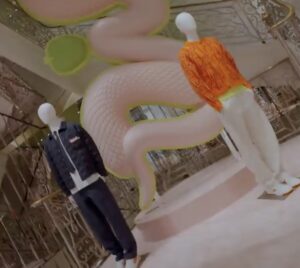In the fall of 1993, a beat dropped that would change the rhythm of hip-hop—smooth, confident, and irreversibly bold. “Shoop,” the lead single from Salt-N-Pepa’s fourth studio album Very Necessary, was more than just a catchy track. It was a statement. It was a flirtation. It was a reclamation. It was, and still is, a moment in music history when women unapologetically flipped the script.
From the opening line—“Here I go, here I go, here I go again…”—to the seductive whistle of the hook, “Shoop” did more than dominate the airwaves. It marked a shift in the culture, one where women in rap didn’t just compete—they commanded. It wasn’t just about bars. It was about attitude, control, and owning the mic on their own terms.
The Rise of Salt-N-Pepa: Context Before “Shoop”
Before Shoop became a chart-topping success, Salt-N-Pepa had already carved a significant space for themselves in the male-dominated world of 1980s and early ’90s hip-hop. Cheryl “Salt” James and Sandra “Pepa” Denton (with Deidra “Spinderella” Roper on the decks) were already known for hits like “Push It,” “Let’s Talk About Sex,” and “Expression.” Each song, in its own way, had challenged norms—whether it was about sexual agency, safe sex education, or the power of self-expression.
But “Shoop” was different. It wasn’t a public service announcement, nor was it playing defense. This was offense. And it was clever, sexy, and ferociously fun.
Flipping the Script: Women as Observers, Not Objects
In most early ’90s rap, women were typically framed as accessories to male pleasure—mentioned in verses, seen in videos, and rarely heard unless singing the hook. “Shoop” took that trope and reversed it entirely. Salt and Pepa weren’t the ones being looked at—they were doing the looking.
The song’s lyrics are playful yet pointed:
“You’re packed and you’re stacked / ’Specially in the back / Brother, wanna thank your mother for a butt like that.”
Lines like these were cheeky, but intentional. They echoed the same kind of admiration that male rappers showed toward women—but now it was men under the microscope. For many listeners, especially women, it was refreshing to hear female MCs vocalize desire without shame or hesitation.
Lyrical Swagger and Feminine Confidence
Salt and Pepa delivered their verses with unmistakable swagger. They weren’t asking for space—they were taking it. The chemistry between their voices, their call-and-response flow, and the sharp clarity of their bars made Shoop stand out among even the most well-produced rap songs of its time.
Salt’s verse opens the track with a magnetic confidence:
“The voodoo that you do so well / It’s a spell, hell, makes me wanna shoop, shoop, shoop.”
That blend of wordplay and wordless expression (“shoop, shoop”) made the song both catchy and open to interpretation. “Shoop” was more than just a sexual euphemism—it was a whole mood. A vibe. A stand-in for attraction, power, pleasure, and self-possession.
Production: Funky, Fresh, and Feminine
Musically, Shoop stands as a brilliant fusion of funk, R&B, and golden-era hip-hop. The track samples “I’m Blue (The Gong-Gong Song)” by The Ikettes and “Super Sporm” by Captain Sky—giving it a throwback groove that feels both timeless and electric.
The beat bumps but doesn’t overpower. The bass is thick, the horns are sharp, and the handclaps echo with just enough air to give the verses space to breathe. Salt-N-Pepa ride the rhythm perfectly, their vocals never getting lost in the mix. The production is tight, but it swings—like a confident strut in audio form.
Impression
Shoop wasn’t just a vibe in the streets—it was a certified commercial hit. The single climbed to #4 on the Billboard Hot 100 and became Salt-N-Pepa’s first top-10 hit as performers on that chart (they had featured in the En Vogue connection with “Whatta Man,” which hit #3 the following year). It also hit #1 on the Hot Rap Songs chart, cementing its place as both a club banger and a radio staple.
But more importantly, Shoop helped push Very Necessary to over five million copies sold in the U.S. alone. That made it one of the best-selling rap albums of the ’90s—and one of the most successful female rap albums of all time.
For women in hip-hop, Shoop was proof that you could be sexy, funny, lyrical, and mainstream all at once. It wasn’t about fitting into a mold—it was about breaking it with style.
Visuals: The Music Video That Made You Look
Directed by Scott Kalvert, the Shoop video was just as iconic as the song. Salt-N-Pepa are seen walking down the boardwalk, dressed in leather and denim, sunglasses on, heads held high, and mouths firing off compliments at passing men. The camera, for once, objectifies male bodies—playfully but powerfully reversing the usual gaze.
In the video, Salt and Pepa aren’t just flirting—they’re calling the shots. Surrounded by women hyping them up, they exude crew energy. It’s communal confidence. Sisterhood and swagger.
This visual mattered. For young women watching in the ’90s, the Shoop video gave permission to be bold, to speak their mind, and to do it in style.
Lasting Legacy: “Shoop” as Feminist Blueprint
Salt-N-Pepa weren’t reading feminist theory in Shoop—they were living it. By taking control of their narrative, voicing their desires, and centering female pleasure and perspective, they crafted a song that feminist thinkers today could easily unpack in a lecture.
In many ways, Shoop is a proto-WAP. It laid the groundwork for women like Nicki Minaj, Cardi B, Megan Thee Stallion, and Doja Cat to express themselves openly in mainstream hip-hop. It said: You can be the subject, not the object. You can want without shame. You can flirt without permission.
Salt-N-Pepa did it first, and they did it loud.
Critical Reception and Industry Respect
While some male critics at the time viewed the song as “role reversal,” fans and music journalists with a broader lens saw it for what it was—long overdue representation and a celebration of female autonomy.
Shoop earned Salt-N-Pepa a new level of respect—not just as entertainers but as trailblazers. They weren’t novelties or gimmicks. They were artists redefining what hip-hop could look and sound like when women took the lead.
Why It Still Hits in 2025
More than 30 years after its release, Shoop still holds up. Play it at a party, and people move. Drop the first line, and everyone finishes it. It’s a generational anthem that transcends nostalgia.
But it’s not just a feel-good throwback. Shoop remains relevant because the fight for space, voice, and ownership in hip-hop is ongoing. Women still have to justify their place, their bars, their bodies. Shoop reminds us that the fight has been happening—and winning—for decades.
Personal Reflections: Shoop as Permission
For many women (and men), Shoop wasn’t just a song—it was permission. Permission to speak. To want. To laugh. To not take yourself so seriously while still being deadly serious about your self-worth.
Salt-N-Pepa weren’t perfect, but they were real. They showed us that feminism could groove. That empowerment could ride a beat. That breaking boundaries didn’t have to mean breaking joy.
A Classic That Changed the Game
“Shoop” isn’t just one of Salt-N-Pepa’s greatest hits—it’s one of hip-hop’s most important cultural moments. It’s the kind of song that shifted the atmosphere, opened doors, and proved that bars don’t have to be aggressive to be powerful—and that being feminine doesn’t mean being submissive.
It’s a celebration. A flirt. A flip of the script. And decades later, it still feels fresh.
No comments yet.








